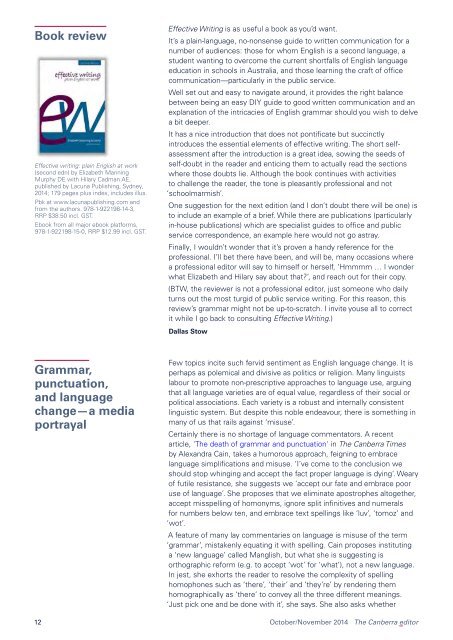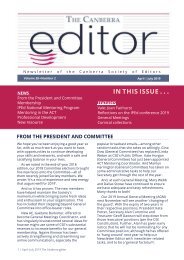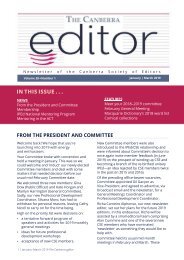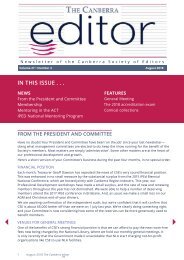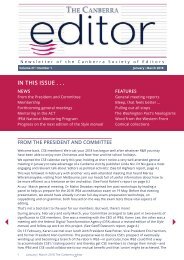The Canberra editor October-November 2014
Newsletter of the Canberra Society of Editors
Newsletter of the Canberra Society of Editors
Create successful ePaper yourself
Turn your PDF publications into a flip-book with our unique Google optimized e-Paper software.
Book review<br />
Effective writing: plain English at work<br />
(second edn) by Elizabeth Manning<br />
Murphy DE with Hilary Cadman AE,<br />
published by Lacuna Publishing, Sydney,<br />
<strong>2014</strong>; 179 pages plus index, includes illus.<br />
Pbk at www.lacunapublishing.com and<br />
from the authors. 978-1-922198-14-3,<br />
RRP $38.50 incl. GST.<br />
Ebook from all major ebook platforms,<br />
978-1-922198-15-0, RRP $12.99 incl. GST.<br />
Effective Writing is as useful a book as you’d want.<br />
It’s a plain-language, no-nonsense guide to written communication for a<br />
number of audiences: those for whom English is a second language, a<br />
student wanting to overcome the current shortfalls of English language<br />
education in schools in Australia, and those learning the craft of office<br />
communication—particularly in the public service.<br />
Well set out and easy to navigate around, it provides the right balance<br />
between being an easy DIY guide to good written communication and an<br />
explanation of the intricacies of English grammar should you wish to delve<br />
a bit deeper.<br />
It has a nice introduction that does not pontificate but succinctly<br />
introduces the essential elements of effective writing. <strong>The</strong> short selfassessment<br />
after the introduction is a great idea, sowing the seeds of<br />
self-doubt in the reader and enticing them to actually read the sections<br />
where those doubts lie. Although the book continues with activities<br />
to challenge the reader, the tone is pleasantly professional and not<br />
‘schoolmarmish’.<br />
One suggestion for the next edition (and I don’t doubt there will be one) is<br />
to include an example of a brief. While there are publications (particularly<br />
in-house publications) which are specialist guides to office and public<br />
service correspondence, an example here would not go astray.<br />
Finally, I wouldn’t wonder that it’s proven a handy reference for the<br />
professional. I’ll bet there have been, and will be, many occasions where<br />
a professional <strong>editor</strong> will say to himself or herself, ‘Hmmmm … I wonder<br />
what Elizabeth and Hilary say about that?’, and reach out for their copy.<br />
(BTW, the reviewer is not a professional <strong>editor</strong>, just someone who daily<br />
turns out the most turgid of public service writing. For this reason, this<br />
review’s grammar might not be up-to-scratch. I invite youse all to correct<br />
it while I go back to consulting Effective Writing.)<br />
Dallas Stow<br />
Grammar,<br />
punctuation,<br />
and language<br />
change—a media<br />
portrayal<br />
Few topics incite such fervid sentiment as English language change. It is<br />
perhaps as polemical and divisive as politics or religion. Many linguists<br />
labour to promote non-prescriptive approaches to language use, arguing<br />
that all language varieties are of equal value, regardless of their social or<br />
political associations. Each variety is a robust and internally consistent<br />
linguistic system. But despite this noble endeavour, there is something in<br />
many of us that rails against ‘misuse’.<br />
Certainly there is no shortage of language commentators. A recent<br />
article, '<strong>The</strong> death of grammar and punctuation' in <strong>The</strong> <strong>Canberra</strong> Times<br />
by Alexandra Cain, takes a humorous approach, feigning to embrace<br />
language simplifications and misuse. ‘I’ve come to the conclusion we<br />
should stop whinging and accept the fact proper language is dying’. Weary<br />
of futile resistance, she suggests we ‘accept our fate and embrace poor<br />
use of language’. She proposes that we eliminate apostrophes altogether,<br />
accept misspelling of homonyms, ignore split infinitives and numerals<br />
for numbers below ten, and embrace text spellings like ‘luv’, ‘tomoz’ and<br />
‘wot’.<br />
A feature of many lay commentaries on language is misuse of the term<br />
‘grammar’, mistakenly equating it with spelling. Cain proposes instituting<br />
a ‘new language’ called Manglish, but what she is suggesting is<br />
orthographic reform (e.g. to accept ‘wot’ for ‘what’), not a new language.<br />
In jest, she exhorts the reader to resolve the complexity of spelling<br />
homophones such as ‘there’, ‘their’ and ‘they’re’ by rendering them<br />
homographically as ‘there’ to convey all the three different meanings.<br />
‘Just pick one and be done with it’, she says. She also asks whether<br />
12 <strong>October</strong>/<strong>November</strong> <strong>2014</strong> <strong>The</strong> <strong>Canberra</strong> <strong>editor</strong>


